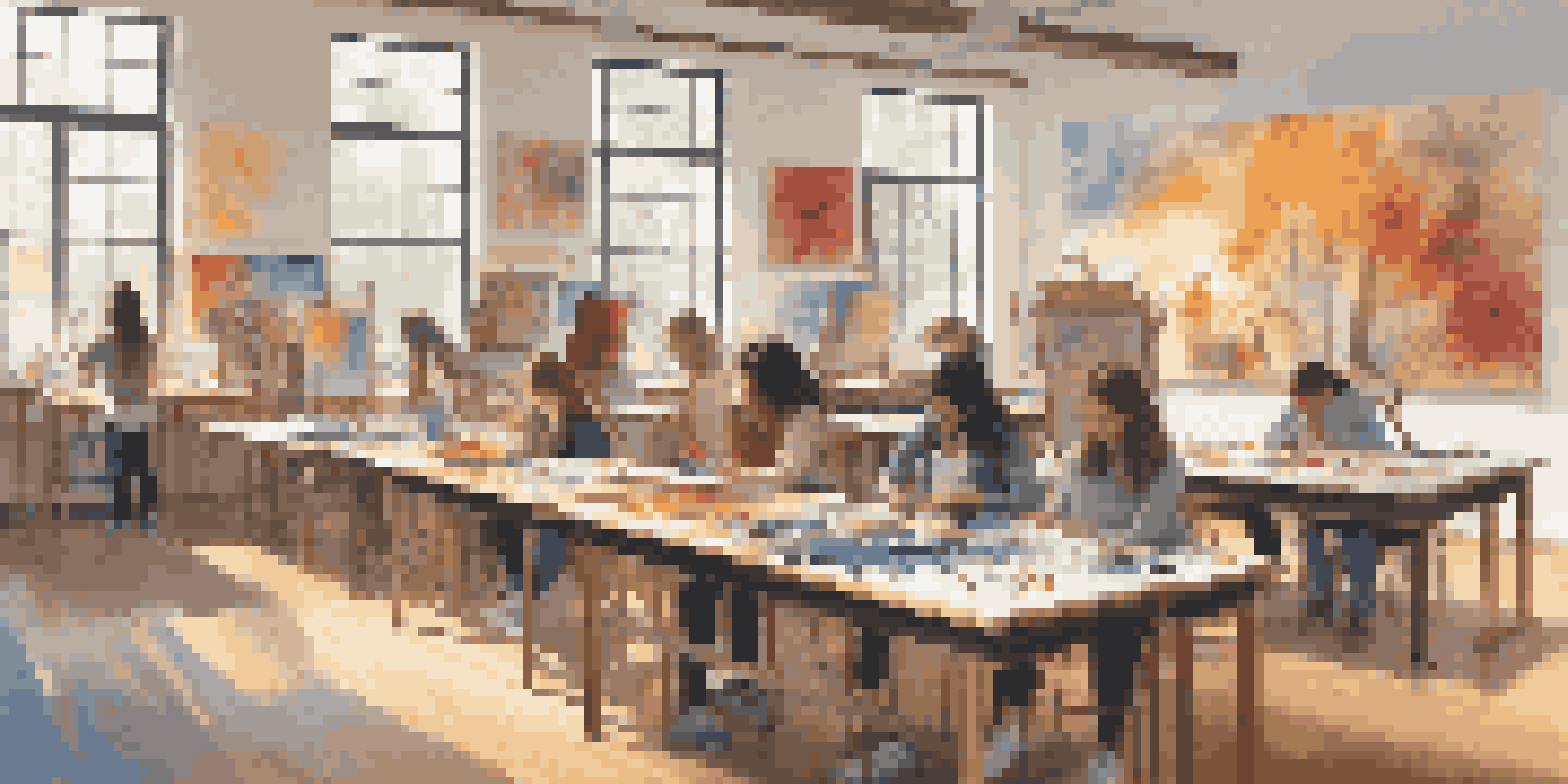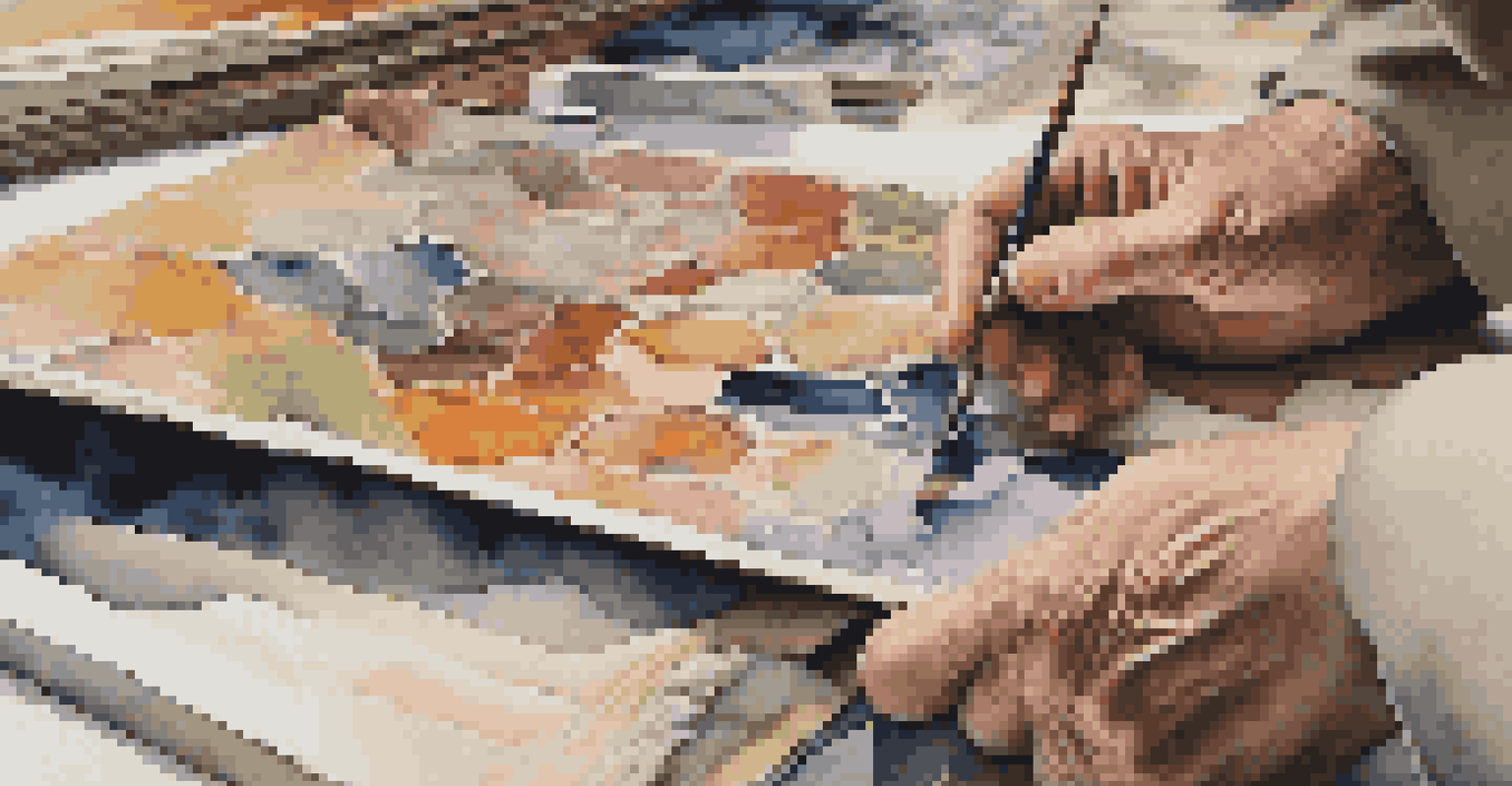The Importance of Art Education for Collectors Today

Understanding the Value of Art Education
Art education is not just for aspiring artists; it plays a crucial role for collectors too. By engaging in art education, collectors gain a deeper understanding of different styles, techniques, and historical contexts. This foundational knowledge helps collectors make informed decisions when purchasing art, ensuring they select pieces that resonate with their personal taste and investment goals.
Art is not freedom from discipline, but disciplined freedom.
Additionally, art education fosters a greater appreciation for the nuances within various artworks. Collectors who understand the significance behind brushstrokes or the story behind a piece are likely to develop a more emotional connection to their collection. This connection can enhance the joy of owning art, making it a more fulfilling experience.
Moreover, the art world is ever-evolving, and staying updated through education allows collectors to adapt to trends and shifts in the market. In a landscape where new artists and styles continuously emerge, being educated empowers collectors to navigate their choices confidently.
Building a Strong Network Through Art Education
Art education often brings together like-minded individuals who share a passion for collecting. Attending workshops, lectures, or courses creates opportunities to connect with fellow collectors, artists, and industry professionals. This networking can lead to valuable relationships that enhance a collector's journey in the art world.

These connections can also provide insights into emerging artists and upcoming exhibitions, which are invaluable for collectors looking to expand their collections. Knowing someone in the know can help collectors be the first to discover new talents before they become mainstream. It’s like having a backstage pass to the art scene!
Art Education Enhances Collecting Skills
Art education equips collectors with the knowledge to make informed decisions and navigate the complex art market confidently.
Furthermore, a strong network can lead to collaborative opportunities, such as co-hosting exhibitions or joining collector groups. These collaborations often enrich the collecting experience and can even lead to increased value in their collections over time.
Navigating the Art Market with Confidence
The art market can be intimidating, especially for new collectors. However, art education equips collectors with the tools they need to navigate this complex landscape. Understanding market trends, valuation methods, and the factors that influence pricing can empower collectors to make strategic purchases.
Every artist was first an amateur.
For instance, knowing how to assess an artist's trajectory can be pivotal in determining whether a piece is a good investment. Art education helps collectors learn to analyze past auction results, gallery representations, and critical reviews, which are all essential in making informed choices.
Moreover, educated collectors can better avoid common pitfalls, such as overpaying for a piece or falling for trends that might not hold value long-term. This knowledge fosters a sense of security, allowing collectors to invest in art with confidence and clarity.
Fostering a Deeper Appreciation for Art
Beyond investment, art education cultivates a genuine appreciation for the beauty and complexity of art. Collectors who understand the historical and cultural significance behind a piece are more likely to cherish it beyond its monetary value. This appreciation transforms art from mere decoration into a meaningful part of their lives.
For example, a collector who learns about the socio-political context of a particular artwork might find it resonates deeply with their personal beliefs. This connection can enrich the overall experience of collecting, making each piece a conversation starter and a source of inspiration.
Networking Opportunities in Art
Engaging in art education fosters valuable connections with fellow collectors and industry professionals, enriching the collecting experience.
Furthermore, this deeper appreciation can lead to a more engaged relationship with the art community. Educated collectors might find themselves wanting to support local artists, attend exhibitions, or even participate in art advocacy, contributing positively to the larger art ecosystem.
Encouraging Diversity in Art Collections
Art education encourages collectors to explore a wide range of styles and mediums, promoting diversity within their collections. Knowing about different art movements, from Impressionism to contemporary street art, allows collectors to appreciate various artistic expressions. This diversity often results in more vibrant and eclectic collections that tell a broader story.
By branching out, collectors can also support underrepresented artists and art forms. Education opens the door to discovering emerging talents or marginalized voices, enriching the art world and providing a platform for diverse perspectives. This can be incredibly fulfilling, knowing that their collection contributes to a more inclusive art landscape.
Moreover, a diverse collection can be a conversation piece, sparking discussions about cultural significance and artistic innovation. Collectors can take pride in showcasing a wide array of works that reflect the world’s rich tapestry of creativity.
Enhancing Critical Thinking Skills Through Art
Engaging with art education fosters critical thinking skills that extend beyond the realm of collecting. As collectors analyze artworks, they learn to ask questions, make connections, and form judgments based on their observations. This analytical mindset can be beneficial in various aspects of life, including personal and professional endeavors.
For instance, when evaluating a piece of art, a collector might consider factors like composition, color theory, and emotional impact. This not only deepens their appreciation for the piece but also encourages them to articulate their thoughts and feelings effectively. These skills can translate to better communication and decision-making in everyday situations.
Appreciation for Diverse Art Forms
Through education, collectors are encouraged to explore various styles and support underrepresented artists, leading to more diverse collections.
Additionally, art education often involves discussions and critiques, which can enhance a collector's ability to engage in constructive dialogue. This not only enriches their understanding of art but also helps them build confidence in expressing their opinions, whether in social settings or professional discussions.
The Lasting Impact of Art Education on Collectors
The investment in art education can have lasting benefits for collectors throughout their lives. As they continue to learn and grow, collectors can adapt their collecting strategies and refine their tastes over time. This evolution fosters a lifelong journey of discovery and joy in the art world.
Moreover, the skills and knowledge gained through art education can be passed down to future generations. Educated collectors can share their passion and insights with family and friends, encouraging a love for art that transcends generations. This creates a ripple effect, promoting a culture of appreciation and understanding.

Ultimately, the importance of art education for collectors today cannot be overstated. It empowers individuals to make informed choices, fosters meaningful connections, and deepens their engagement with art, making the journey of collecting not just about ownership but about enrichment and growth.